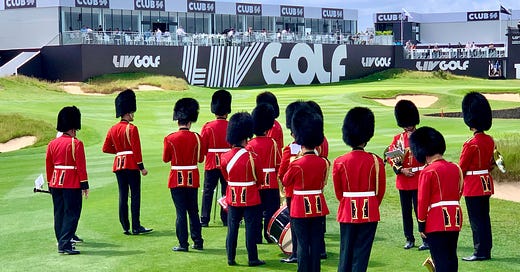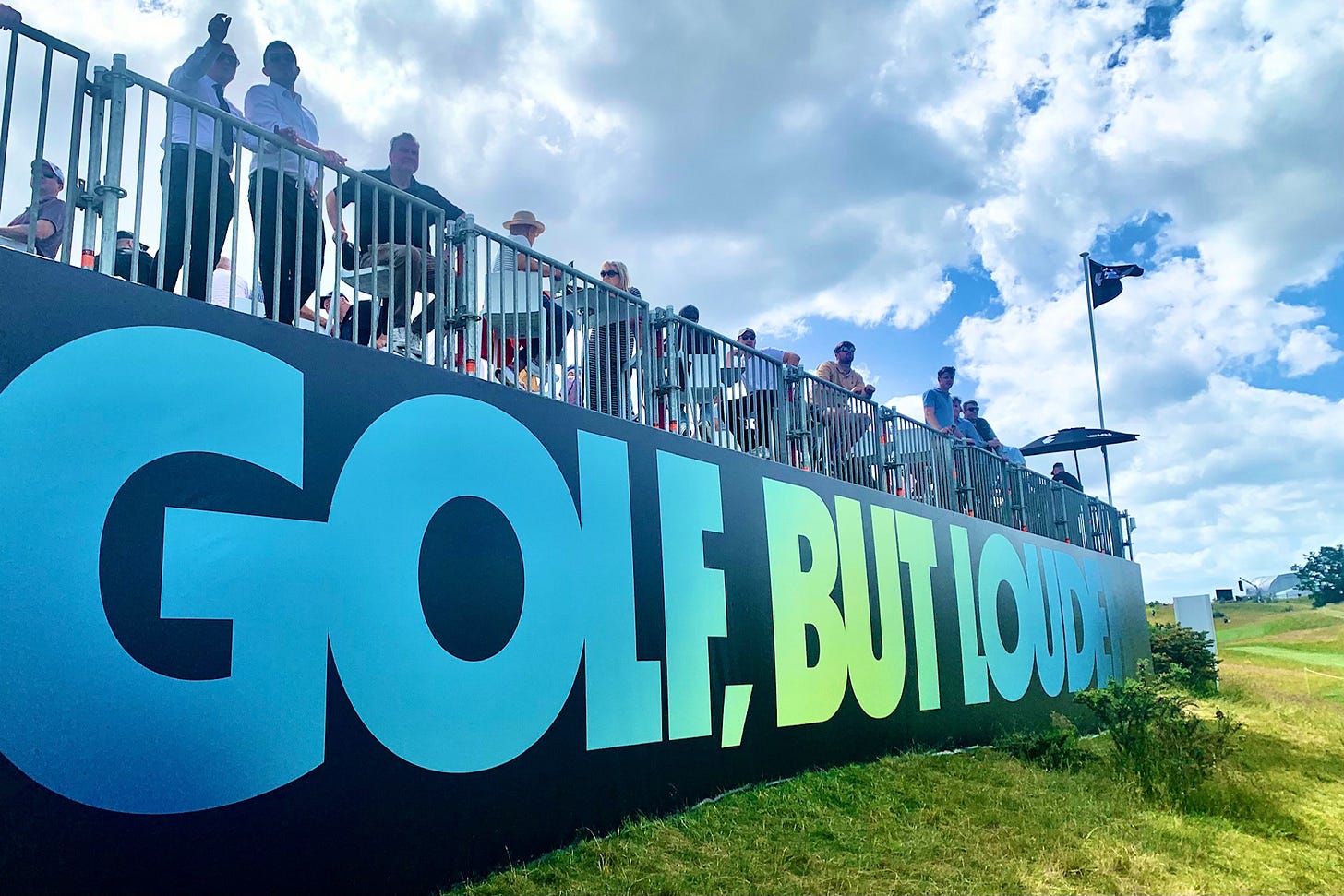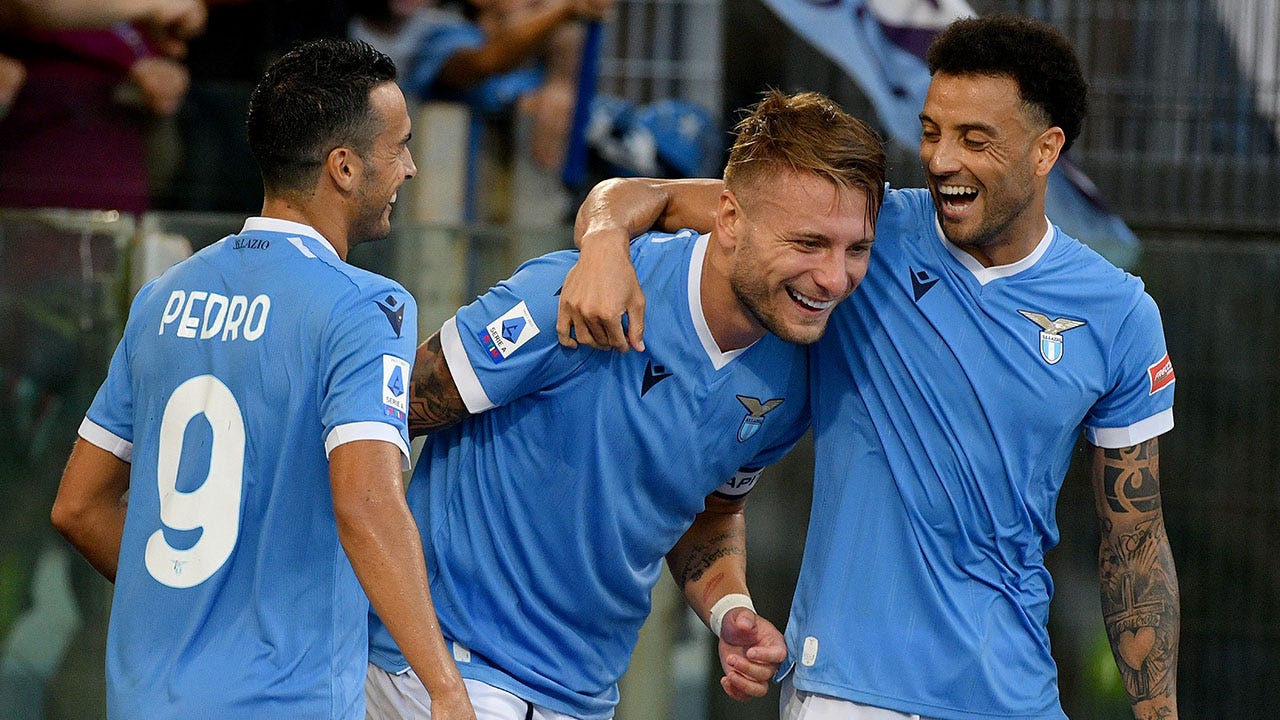At least Paddington Bear didn’t sell himself out to the Saudis’ LIV Golf rebellion. He mixes in higher circles. The Grenadier Guards, London’s cabbies and a few vintage fighter plane owners had fewer scruples. As have a growing number of the world’s top golfers.
I found my jaunt to St Albans a curiously unrevolutionary experience. Massive hoardings urged me ‘DON’T BLINK’ and promised ‘GOLF BUT LOUDER’. Instead I found myself straining to hear the whispers of my fellow free-ticket holders clustered around the better known players - DJ and Big Phil to the fore. I didn’t find anyone who had paid for entry.
Maybe it was the embarrassment of free-loading that quietened our spirits. Even a decidedly sober “get in the hole!” from a lone voice as arch-rebel Phil Mickelson limbered up for his opening drive didn’t elicit a titter from the gallery.
“Last weekend I grabbed some free tickets for tomorrow as it became the cheapest mini golf / bouncy castle option in the area for me to take my kids….!” I hope my mate’s offspring enjoyed the mini golf. If there was a bouncy castle at the Centurion Club it evaded me.
This was a knowledgable crowd, content with their amateur analysis of breeze direction, yardage and pin positions, as well as curiosity at the team competition overlaying the individual event. Could team members help each other line up putts? Would they want to if they were also both in contention for the individual prize? Did we really care either way?
To the players, we might as well not have been there, so little was their interaction with the live audience. It was as if we were watching a bunch of golfing mates out for a regular Friday weekend round to kick-off their weekend. Just bloody good ones. No hackers or bandits among them, however much the sport’s establishment might carp at the lowly world rankings of LIV’s lesser lights. Don’t worry, many higher ranked ones are coming.
This felt like a dress rehearsal in which the actors had yet to fully commit to their roles. The organisers were nibbling at the edges of golf’s conventions, not yet shredding them. Shot-gun starts offend the puritans - all players should play the holes in the same order, surely? - but the resulting tighter competition day is welcome. Three days not four makes sense, although ending on a Saturday rather than Sunday seems strange. Perhaps it’s to coincide with the Saudi weekend? Team competition could work in time, but needs much more imagination and commitment.
The trouble for those at the course itself is that golf is a hard watch in the flesh. Logistically tricky. Frequently dull for any but the hardcore cognoscenti. Little wonder American crowds have taken to littering greens with beer cans to turbo charge their enjoyment. LIV needs to elevate fan engagement to at least majors if not Ryder Cup level, but without the beer showers.
Surreal sight and sound of the day: the Grenadier bandsmen marching through the Fan Zone playing Pharrell Williams’ Happy
This is a shaped-for-TV sport. LIV is now reshaping it, arguably for the better as a sofa product, if not for the cohesiveness of its professional networks. I came away from St Albans having marvelled at a few shots, but marvelling more at how the economics of golf can work, even before the Saudi splurge. It must take a lot of broadcast income and profits on clubs, balls, polo shirts and peaked caps to balance the books. Little wonder the best players wear political blinkers as well as visors, tee up and take the cash.
Taking a swipe
Three golfers on the latest Forbes list of the 50 richest sportspeople. Just five ‘soccer’ stars, three tennis players and not a mainstream Olympic sport or Paralympic athlete in sight. Two thirds of the most monied come from basketball and American football.
Some context this in which to read para tennis player Andy Lapthorne’s complaints about his financial struggles. His is the constant challenge for para athletes and those of us helping to lead disability sports. At least Lapthorne has the backing of a wealthy governing body and events embedded into the able-bodied majors to cushion him. Most elite disabled athletes are nowhere near as fortunate.
There is no easy solution, not while public interest centres largely on the four-yearly Paralympics, but setting sights at realistic levels is a must. Struggles for financial advancement have to include building audiences.
You can read Andy Lapthorne’s views here: The Times
You better you bet
Just as Newcastle United’s Saudi owners call time early on their shirt-front betting sponsor in search of a more lucrative deal, so Everton’s go the other way replacing an online car retailer with a gambling brand. The Toffees must have another early exit clause in their new contract given mounting speculation that betting brands will be banned from Premier League shirts after next season.
This week sports governance consultancy, I Trust Sport, published a paper which asks whether banning gambling advertising could threaten the integrity of English football by driving more betting into the arms of unregulated, grey market operators.
I’m tempted to think that any attempts to corrupt the game would occur, advertising ban or not. And I Trust Sport doesn’t believe this risk outweighs the benefits of any restrictions. More powerful is their conclusion that English football can withstand the withdrawal of betting revenues - which have already halved as a proportion of overall sponsor income in recent years.
“Tranmere have a shirt deal estimated to be worth up to £150,000. With an extra £50,000 on offer from a gambling firm, the most significant consequence of the smaller deal might be signing one less player to their squad. Or one-and-a-half players if back of shirts and betting kiosks are included.” Ed Hawkins, I Trust Sport
It cites precedents in Italy and Spain where clubs have typically managed to fill the financial and physical gap left by the removal of betting brands from their shirts. Overall Italian shirt sponsorship revenues are up post ban, although that will be little consolation to Lazio whose shirts remain ‘clean’.
The EFL and its 72 clubs will be sweating over the future of its Skybet title sponsorship which runs for another two years. But the distribution of TV revenues, including from the Premier League, dwarfs the value of this deal, which for all its visibility is believed to be worth only around £8m a year.
The real test for English football would come when TV rights are next renegotiated, if gambling ads are banned. Mainstream consumer brands may be eager to adorn club shirts, but will they advertise in sufficient numbers for broadcasters to replace lost ad income from betting sites, which in turn underpins today’s meaty rights fees?
Read the report here: I Trust Sport






